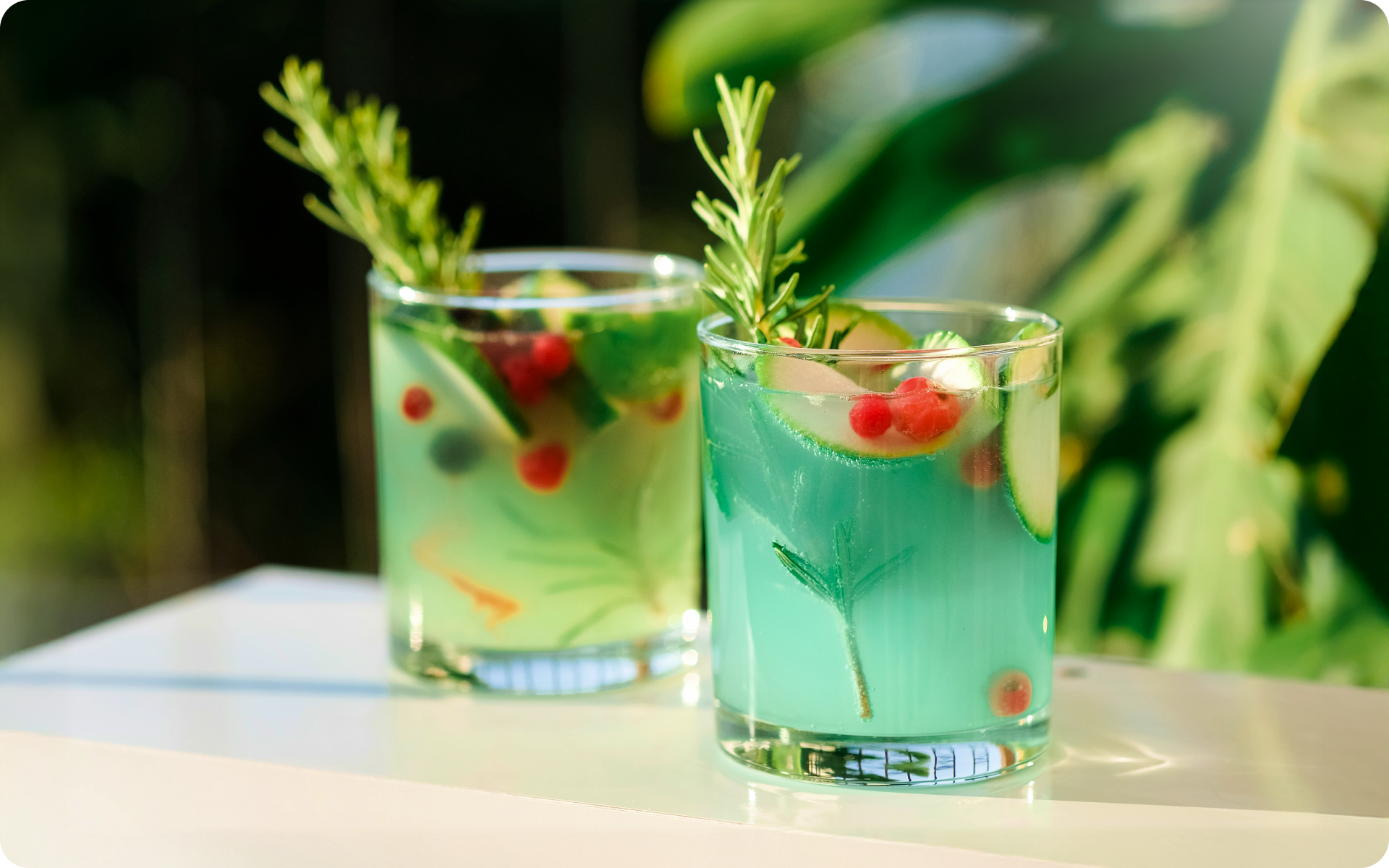According to the National Institute on Alcohol Abuse and Alcoholism, drinking less is always better than drinking more, and it recommends limiting your alcohol intake to two drinks or less per day for men and one drink or less per day for women (12).
Unfortunately, many people often exceed these recommendations, particularly when they’re drinking socially or on the weekends. Society has made it perfectly acceptable to drink in excess and continuously glamorizes excessive drinking.
While this may seem fun for a while, your health and general well-being can take a major hit if you don’t quit while you’re ahead. If you’re considering cutting down your alcohol intake or quitting altogether but you’re not sure if it’s really worth it, then you’ve come to the right place.
Cutting alcohol out for two weeks can have some impressive benefits, including weight loss, improved sleep, and increased energy levels. Let’s take a look at some of the science-backed benefits of giving up alcohol for two weeks.
What Happens After 2 Weeks of Not Drinking?
Not drinking for 2 weeks could actually save your liver.
There are multiple ways to metabolize ingested alcohol, but the main organ that does this is the liver. When you drink alcohol, your liver produces two enzymes, alcohol dehydrogenase (ADH) and aldehyde dehydrogenase (ALDH), to help break down alcohol for easier elimination from the body (7).
Alcohol dehydrogenase works first to start the breakdown process where it trunks your drink into acetaldehyde – a highly toxic substance and known carcinogen. Here, the aldehyde dehydrogenase comes into play to further break down this toxic substance to a less toxic compound called acetate.
The acetate is then broken down into carbon dioxide and water by other tissues before being eliminated. However, if you drink too much alcohol or you drink too quickly, your liver doesn’t have enough time to break down all the toxic acetaldehyde.
In the short term, this can lead to simple nausea, vomiting, and headaches. However, in the long term, it can damage your liver, which leads to chronic liver disease (7, 6).
If you tend to let yourself off the hook, raise the white flag when things get tougher than you expected, send yourself on an unconscious binge-eating trip – BetterMe app is here to help you leave all of these sabotaging habits in the past!
To better understand how the experience of quitting alcohol for 2 weeks may look, here’s a timeline of the symptoms and benefits you may experience:
Day one without alcohol
Withdrawal symptoms, commonly referred to as a hangover, may peak. Hangover symptoms can range from mild, such as a headache or nausea, to severe, such as vomiting and shaking.
The severity of the symptoms you get during these first 24 hours is largely dependent on how much you drink and how often you drink.
Days two to four
Your symptoms should start to improve. You may still have a headache or feel tired, but it’s nothing compared to the withdrawal symptoms you experienced on day one.
Again, if you’ve been drinking heavily for many years, your symptoms may take longer to improve. Delirium tremens, or DTs, is a severe form of alcohol withdrawal that can occur in heavy drinkers. Symptoms include confusion, hallucinations, and seizures. Severe cases of alcohol withdrawal often require hospitalization.
Days five to seven
By day five or six, most people feel almost back to normal. If you’re still experiencing symptoms, you should see a doctor. Your body may have become dependent on alcohol without you realizing and you will need professional help to fully quit.
Week 2
After an entire week or more of giving up alcohol, you may experience more profound improvements to your health and wellness. Some notable changes are discussed below.
What Are the Benefits of 14 Days Without Alcohol?
The first week after quitting alcohol is generally the hardest. During the second week, things may still be difficult, but not as bad as they were during the first week. Here are some potential benefits that can convince you to keep up the fight:
Better Sleep
Alcohol has been shown to disrupt sleep (11). It may make it difficult to fall asleep and stay asleep. After two weeks of sobriety, you should find it easier to fall asleep and stay asleep throughout the night.
Research has shown that quitting alcohol can increase the amount of REM sleep you get each night. This is the stage of sleep when your body repairs itself and consolidates memories (8).
A good night’s sleep spills over into the next day, which makes you more productive and less likely to make mistakes. You’ll also have more energy to exercise and be active, which are important for overall health and weight loss.
Improved Hydration
Dehydration is a common side effect of drinking alcohol (10). Alcohol is a diuretic that inhibits vasopressin, the body’s antidiuretic hormone. Without vasopressin, the bladder fills up more quickly, making you pee more, which drains water from your body faster.
This can lead to dehydration and make you feel thirsty. After two weeks without alcohol influencing vasopressin, you should be better hydrated.
Not only will you drink more water, your body will also be better able to absorb and retain water. The frequency of urination will also be back to normal. All this can help improve your skin health, digestion, and brain function.
Read more: 2 Weeks Without Alcohol: Weight Loss and Other Benefits
Weight Loss
Research has shown that while light to moderate drinking doesn’t have much impact on weight, heavier drinking is associated with weight gain and obesity (4, 27).
Drinking alcohol tends to lead to higher calorie intake from food, mixers, and the alcohol itself. Therefore, cutting out alcohol can help you lose weight. In addition, alcohol is often high in empty calories and sugar and over time, these empty calories plus sugar will lead to weight gain (4).
One study found higher BMI, percent body fat, and waist circumference in individuals who drink five or more drinks per day compared to non-drinkers (3)
If you’re trying to lose weight, cutting out alcohol can help you achieve your goals. In addition to reducing your calorie consumption, quitting can help you make better food choices. It can also reduce impulsive behavior and cravings, which often lead to overeating.
Improved Mental Health
Heavy drinking can take a toll on your mental health. It has been linked to depression, anxiety, and memory problems (17). If you’re struggling with mental health issues, cutting out alcohol may help improve your symptoms.
Not only can alcohol worsen existing mental health problems, it can also contribute to new ones. For example, alcohol use disorder (AUD) is a form of addiction that can develop as a result of heavy drinking (28).
Symptoms of AUD include a strong need to drink, trouble controlling your drinking, and continued drinking even though it’s causing problems in your life. If you’re struggling with AUD, quitting alcohol can help you get your life back on track. Don’t be afraid to seek help with quitting.
Improved Gut Health
Heavy drinking can damage the lining of your gut, which can result in inflammation. This can cause or worsen a variety of problems, such as digestive issues, intestinal permeability, and inflammatory bowel disease (2).
Cutting out alcohol can help heal your gut and reduce inflammation. This can improve your digestion, increase nutrient absorption, and support your immune system (15).
If you’re having digestive issues due to gluten and can’t figure out why symptoms are not improving despite overhauling your diet, alcohol may be the problem. A good gluten-free diet plan for beginners generally advises people to quit alcohol as many such beverages contain gluten.
Most beer, lagers, stouts, and ales contain gluten as they’re made from wheat, barley, and rye – all grains that are high in gluten. If you want to have something to drink, ciders or alcoholic options such as wine, distilled spirits, and liqueurs are gluten-free options that you can enjoy in moderation.
Improved Liver Function
The liver plays a role in hundreds of essential body processes. It helps filter toxins from the blood, produces bile for digestion, and stores nutrients (19).
As mentioned above, heavy drinking can damage the liver over time and lead to a variety of problems, such as cirrhosis, fatty liver disease, and hepatitis. If you have liver damage, quitting alcohol for good can help improve your liver function (5).
In some cases, the damage caused by heavy drinking is irreversible (14). However, quitting alcohol can help slow the progression of liver damage and improve your overall health.
Improved Skin Health
Alcohol can contribute to a variety of problems for your skin, such as dryness, redness, and inflammation. It can also make existing skin conditions worse (25). For example, alcohol use has been identified as a trigger for psoriasis (21).
If you’re struggling with skin problems, cutting out alcohol may help improve your symptoms. Not only can alcohol worsen existing skin conditions, it can also lead to new ones.
You Can Save More Money
Drinking alcohol can be an expensive hobby or pastime.
If saving more money is your goal this year to either get out of debt, buy something you’ve wanted for a while, or simply work towards financial freedom, then cutting out alcohol could help more than you think. Not only will you save money on drinks, you’ll also spend less on things such as taxis and Uber rides home.
Reduced Risk of Health Problems
Heavy drinking can contribute to a variety of health problems in the long term, including liver damage, heart disease, and certain types of cancer (16). If you’re struggling with any of these health problems, cutting out alcohol may help improve your symptoms or reduce your risk.
BetterMe app is a foolproof way to go from zero to a weight loss hero in a safe and sustainable way! What are you waiting for? Start transforming your body now!
How Long After Giving Up Alcohol Will I Lose Weight?
It’s difficult to say, mostly because weight loss is based on a number of factors, not just alcohol consumption. In order to get rid of those extra pounds, your genetics, biological sex, diet, exercise, and alcohol consumption matter.
However, heavier drinkers may lose weight faster than moderate drinkers. This is because the former are already consuming more empty calories and therefore, stopping will drastically reduce their calorie intake, likely leading to weight loss.
Moderate drinkers will also lose weight if they quit alcohol, which as previously mentioned increases sugar and calorie intake. Alcohol also affects how well and often you work out. Quitting directs your attention to more healthy endeavors, and not battling a hangover will make it easier for you to work out harder and for longer.
Will I Lose Belly Fat If I Stop Drinking Alcohol?
Yes you might, but quitting alcohol is not the only factor to help you lose belly fat. Alcohol contributes to belly fat in both men and women by increasing visceral fat (9)
Visceral fat is the type of fat that surrounds your organs and increases your risk of health problems (1). Men in particular should take more caution when they consume alcohol because while it increases overall weight, belly fat, and visceral fat in both men and women, men are at a higher risk of abdominal obesity (3, 22).
If you’re trying to lose belly fat, cutting out alcohol can be a helpful step. Incorporating other lifestyle changes, such as eating a healthy diet and getting regular exercise, will also help you lose weight and reduce visceral fat (29).
How Long Does It Take to Detox From Alcohol?
The length of time it takes to detox from alcohol is dependent on several, including how much you drink and how long you’ve been drinking.
Most people can detox from alcohol in a matter of days. However, some may experience withdrawal symptoms, which can last for several weeks or longer.
If you’re trying to detox from heavy alcohol use, it’s important to do so under the supervision of a medical professional. Withdrawal symptoms can be serious and in some cases, life-threatening.
Read more: Can You Drink Alcohol on the 16/8 Diet? The Truth According to Experts
What Causes Weight Gain After Quitting Alcohol?
In some cases, people gain weight after they quit alcohol. This weight gain is generally due to an increase in calorie intake. This is particularly true if you turn to food to ease withdrawal symptoms or cravings.
Weight gain can also be due to an increase in appetite. Some people find they’re hungrier when they stop drinking and this increased appetite can lead to weight gain if you’re not careful.
If you’re trying to lose weight, it’s important to be mindful of your calorie intake. Make sure you eat nutritious foods and don’t overeat. You may also want to consider adding more physical activity to your routine (29).
If you’re worried about gaining weight after quitting alcohol, try replacing high-calorie drinks with water or unsweetened tea. This can help you stay hydrated and avoid adding extra calories to your diet.
When Should I See a Doctor?
If you’re struggling with alcohol abuse, it’s important to seek professional help. Alcohol addiction is a serious problem that can lead to health problems, financial problems, and relationship problems (26).
Signs of addiction include drinking more alcohol than you intend to, being unable to cut back on drinking, and experiencing withdrawal symptoms when you try to stop (26).
If you’re struggling with addiction, there are several treatment options available. Treatment can help you overcome addiction and regain control of your life.
Some treatment options include (13):
Inpatient treatment
This type of treatment is designed for people who are struggling with severe addiction. Inpatient treatment involves staying in a rehabilitation center for some time. While you’re in treatment, you’ll receive 24-hour care and support.
Outpatient treatment
This type of treatment is designed for those who are struggling with less severe addiction, or as a transition from inpatient care. Outpatient treatment involves attending counseling sessions and support groups. You’ll be able to live at home while you receive treatment.
Individual therapy
This type of therapy can help you identify the underlying causes of your addiction and can also help you develop healthy coping skills.
Group therapy
This type of therapy provides support and encouragement from others who are also struggling with addiction. Group therapy can help you develop healthy coping skills and build a support system.
FAQs
Is 21 days without alcohol good?
Yes, it is. From the benefits of 14 days without alcohol we’ve outlined above, it can be seen that a mere 2 weeks without alcohol can cause major positive changes in your body, health, and lifestyle. 3 weeks or 21 days without drinking will continue to improve these benefits and give you an even better quality of life.
Does your metabolism change when you stop drinking?
Yes, it does, and for the better.
When you drink alcohol, your liver prioritizes breaking down the alcohol over other metabolic processes. When your liver is free to do its job without needing to process alcohol, you can turn nutrients into energy more efficiently and support your body’s many functions and your daily activities.
Do your hormones change when you stop drinking alcohol?
Yes, they might.
According to a study from 2017, alcohol abuse disrupts and causes abnormalities in the endocrine system. This system is made up of glands that make the hormones that act as messengers in the body and also affect things such as your organs and circulatory system.
The overconsumption or abuse of alcohol disrupts the hormones, which leads to issues such as stress intolerance, reproductive dysfunction, thyroid problems, immune abnormalities, and psychological and behavioral disorders (18).
Studies have also shown that alcohol abuse or heavy drinking leads to sexual dysfunction in men as it reduces testosterone levels in the blood. This leads to issues such as premature ejaculation, low sexual desire, and erectile dysfunction (23, 20, 24).
Does quitting alcohol reduce belly fat?
Yes, quitting alcohol is one of the factors that can help reduce belly fat. To make the effects last longer, ensure to exercise – using both cardio and weight lifting – and also change your diet. A healthy, balanced, reduced-calorie diet is one of the best eating plans for reducing belly fat and resulting in overall weight loss.
Can I drink alcohol on the 30-day no-sugar challenge?
Yes, you can drink alcohol on the 30-day no-sugar challenge, but you should avoid all sugary alcoholic beverages such as mixed drinks, sweetened liquor, and sweetened canned alcoholic drinks.
However, for the best health results, we suggest combining the 30-day no-sugar challenge with quitting alcohol. Killing two birds with one stone will be better and more rewarding.
The Bottom Line
Giving up alcohol can have several benefits, including weight loss, improved health, and increased productivity. If you’re struggling with addiction, there are several treatment options available to help you overcome your alcohol dependence.
DISCLAIMER:
This article is intended for general informational purposes only and does not serve to address individual circumstances. It is not a substitute for professional advice or help and should not be relied on for making any kind of decision-making. Any action taken as a direct or indirect result of the information in this article is entirely at your own risk and is your sole responsibility.
BetterMe, its content staff, and its medical advisors accept no responsibility for inaccuracies, errors, misstatements, inconsistencies, or omissions and specifically disclaim any liability, loss or risk, personal, professional or otherwise, which may be incurred as a consequence, directly or indirectly, of the use and/or application of any content.
You should always seek the advice of your physician or other qualified health provider with any questions you may have regarding a medical condition or your specific situation. Never disregard professional medical advice or delay seeking it because of BetterMe content. If you suspect or think you may have a medical emergency, call your doctor.
SOURCES:
- a critical review of methods for visceral adipose tissue analysis (2014, birpublications.org)
- Alcohol and Gut-Derived Inflammation (2017, ncbi.nlm.nih.gov)
- Alcohol consumption and body composition in a population-based sample of elderly Australian men (2013, pubmed.ncbi.nlm.nih.gov)
- Alcohol Consumption and Obesity: An Update (2015, link.springer.com)
- Alcoholic Liver Disease: Pathogenesis and Current Management (2017, ncbi.nlm.nih.gov)
- Alcohol Metabolism (2012, sciencedirect.com)
- Alcohol Metabolism (2022,.niaaa.nih.gov)
- Alcohol’s Effects on Sleep in Alcoholics (2001, ncbi.nlm.nih.gov)
- Associations between alcohol consumption and body fat distribution in type 1 diabetes (2023, sciencedirect.com)
- Dehydration: A new alcohol theory (1990, sciencedirect.com)
- Disturbed Sleep and Its Relationship to Alcohol Use (2009, ncbi.nlm.nih.gov)
- Drinking Levels Defined (n.d., niaaa.nih.gov)
- EARLY INTERVENTION, TREATMENT, AND MANAGEMENT OF SUBSTANCE USE DISORDERS (2016, ncbi.nlm.nih.gov)
- Exploring Alcohol’s Effects on Liver Function (1997, ncbi.nlm.nih.gov)
- Gut Microbiome: Profound Implications for Diet and Disease (2019, mdpi.com)
- Health Risks and Benefits of Alcohol Consumption (2000, ncbi.nlm.nih.gov)
- Mental health and alcohol use: a cross-sectional study of the Finnish general population (2014, academic.oup.com)
- Pathophysiology of the Effects of Alcohol Abuse on the Endocrine System (2017, ncbi.nlm.nih.gov)
- Physiology, Liver (2022, ncbi.nlm.nih.gov)
- Prevalence of sexual dysfunction in male subjects with alcohol dependence (2007, ncbi.nlm.nih.gov)
- Psoriasis and alcohol (2019, ncbi.nlm.nih.gov)
- Relationship of abdominal obesity with alcohol consumption at population scale (2007, pubmed.ncbi.nlm.nih.gov)
- Sex hormones during alcohol withdrawal: a longitudinal study of 29 male alcoholics during detoxification (1997, pubmed.ncbi.nlm.nih.gov)
- Sexual dysfunctions in alcohol-dependent men: A study from north India (2016, ncbi.nlm.nih.gov)
- The effects of alcohol and illicit drug use on the skin (2021, sciencedirect.com)
- The Past and Future of Research on Treatment of Alcohol Dependence (2010, ncbi.nlm.nih.gov)
- The relationship of alcohol use to weight loss in the context of behavioral weight loss treatment (2016, ncbi.nlm.nih.gov)
- Understanding Alcohol Use Disorder (2020, niaaa.nih.gov)
- Weight-Loss and Maintenance Strategies (ncbi.nlm.nih.gov)












